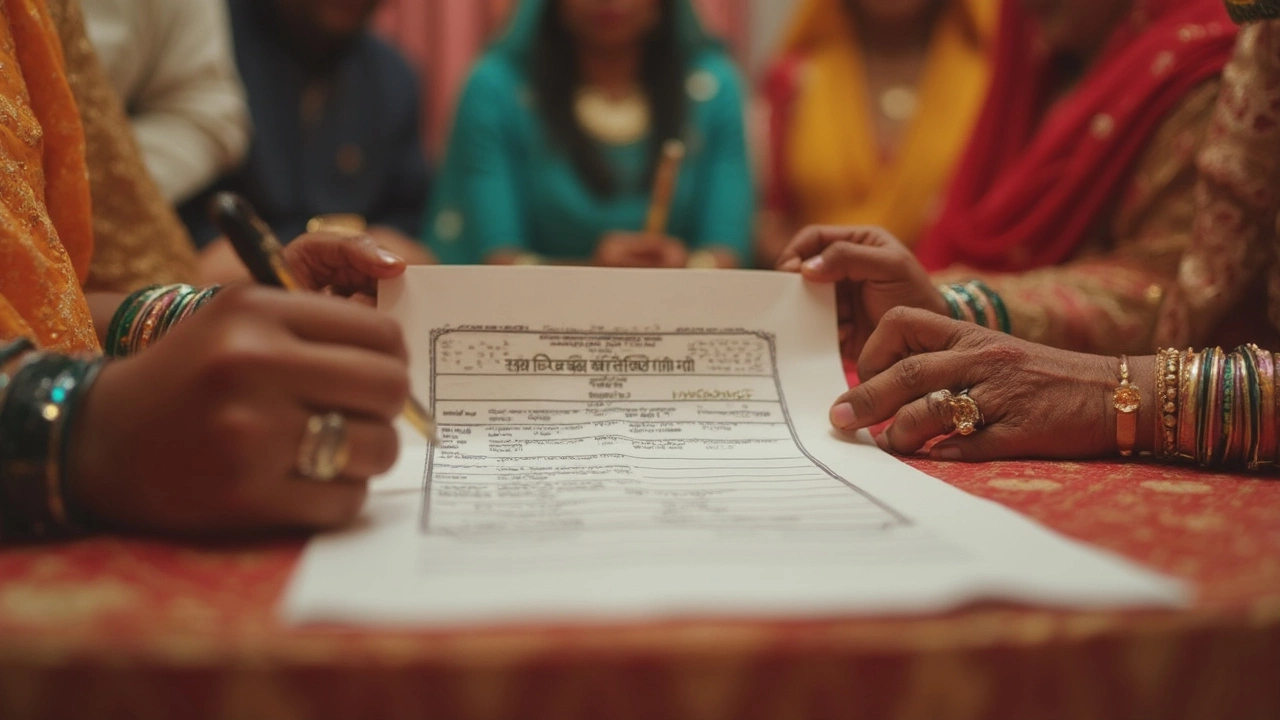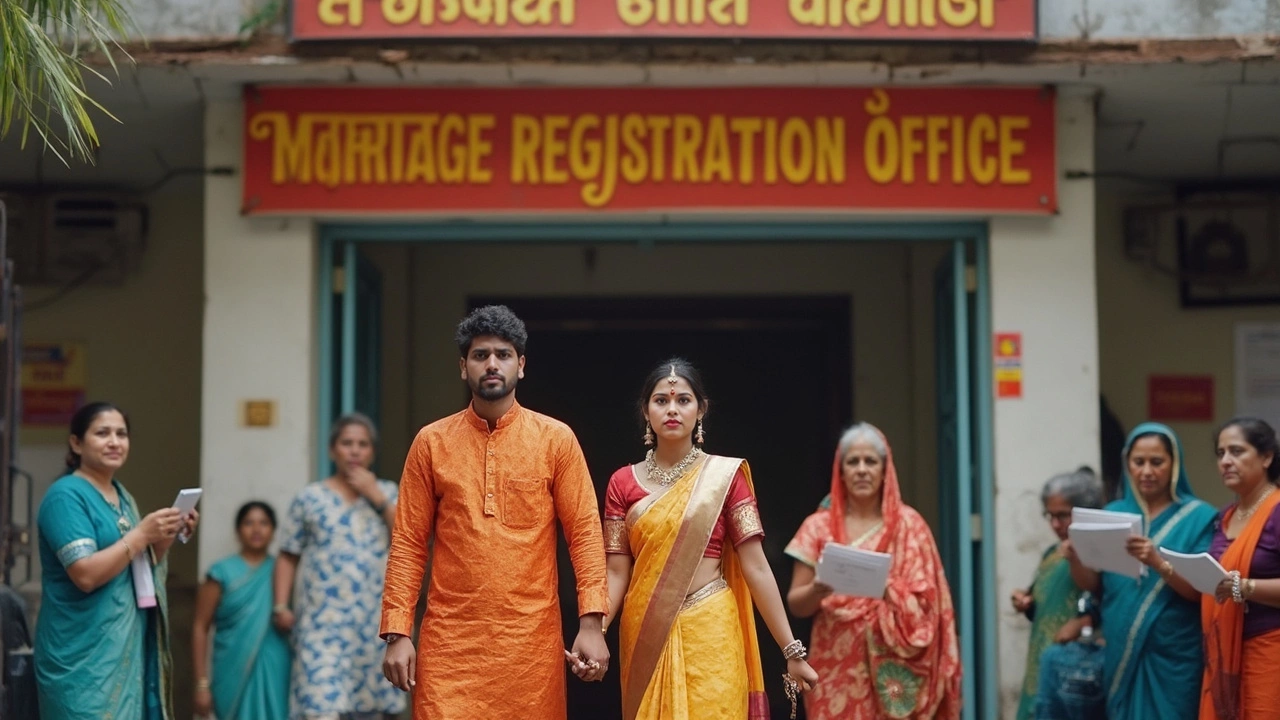If you ask ten people in India whether marriage registration is compulsory, you’ll probably get ten different answers. The confusion’s real, and it’s not just talk—some couples find themselves in messy spots later because no one explained the basics straight. If you’re married or getting there soon, knowing the rules could save you a lot of trouble down the road.
Officially, Indian law says you should register your marriage, but in most states, it’s not strictly enforced. There’s no nationwide law that throws you in jail for skipping it. Still, courts have pushed hardcore for registration after several high-profile cases made headlines—think property fights, inheritance messes, or passports stuck in limbo just because the certificate was missing. The Supreme Court even suggested that all marriages should be registered, but it stopped short of making it a criminal offense not to do it. Each state has its own rules and deadlines, though, so what’s chill in Delhi could be a big deal in Kerala.
- What the Law Says About Marriage Registration
- Why Couples Skip Registration and the Risks Involved
- How Registration Can Save You Hassles Later
- Practical Tips for Registering Your Marriage in India
What the Law Says About Marriage Registration
There’s a lot of back-and-forth when it comes to marriage registration India. On paper, the law suggests you should register your marriage, but it isn't fully tough across the board. No single act covers everyone, since India has different marriage laws for different communities. Hindus, Muslims, Christians, Parsis—each group has its own set of rules. The Special Marriage Act, 1954, is the one that’s open to all citizens regardless of religion. If you get married under this act, registration is mandatory. If you go by your personal laws, like the Hindu Marriage Act, it still strongly encourages you to register, but few states hit you with heavy penalties if you skip it.
After the Supreme Court pushed for reforms in 2006, things started shifting. The court said,
“The registration of marriages should be made compulsory in all states for the protection of women’s rights and the prevention of child marriages.”
But the Center never made one strict law for the whole country. Instead, states introduced their own rules. For example, Maharashtra, Haryana, and Rajasthan made registration within a certain number of days after marriage compulsory. Penalties? Usually small fines, but they change from state to state. Delhi charges a late fee if you wait more than 60 days. West Bengal gives you a whole year to get it done before adding a penalty. Here’s a quick look at a few state deadlines and penalties:
| State | Deadline | Penalty if Late |
|---|---|---|
| Delhi | 60 days | Rs. 500 |
| Maharashtra | 90 days | Rs. 100 |
| Rajasthan | 30 days | Rs. 1,000 |
| West Bengal | 1 year | Rs. 400 |
If your marriage isn’t registered, it doesn’t mean it’s suddenly illegal. The wedding is still valid if all the rituals were done right for your community. But if you ever need to prove your marriage for a visa, passport, or legal matters, a certificate is non-negotiable. More and more government offices and banks are now asking for your marriage registration certificate, especially in bigger cities. Not having it is a headache you don’t need.
Why Couples Skip Registration and the Risks Involved
So, why do so many couples in India give marriage registration a miss? Lots of folks still believe traditional weddings—like big fat desi ceremonies or simple temple rituals—are all that's needed. Sometimes, families see government paperwork as an extra headache. Others think registration is pointless if society already recognizes them as married.
Some people worry it will take too much time, involve random fees, or drag them into endless queues at government offices. A lot of couples only find out about the need for a register marriage when they plan to go abroad, apply for a spouse visa, or get into property stuff. If your partner is from a different religion or state, the paperwork seems double the trouble, so they just skip it altogether.
The risks? They’re bigger than most people guess. Say you need to open a joint bank account, get health insurance, or buy property as a couple. Without a formal marriage certificate, you’ll hit a wall. If things ever go south—a legal fight, separation, or worse, death—proving you were actually legally married gets messy. This seriously messes up inheritance rights and pension claims, especially for women. There was a famous case where a widow couldn’t claim her husband’s government pension just because the ceremony was done, but the marriage registration wasn’t.
Check out how much of a problem this gets in daily life:
| Scenario | Without Marriage Registration |
|---|---|
| Applying for spouse visa | Application gets rejected or delayed |
| Bank loans as a married couple | Extra paperwork or outright refusal |
| Legal disputes or claims in court | Struggle to prove marriage exists |
Here’s the bottom line: skipping marriage registration can look easy at first, but it can bite you back when you need the law on your side. The process may feel like a hassle, but having the government recognize your marriage saves you a world of stress later.

How Registration Can Save You Hassles Later
Skipping marriage registration India might seem harmless at first, but wait until you actually need that certificate. Tons of paperwork—everything from spouse visa, joint home loans, to school admissions for kids—will ask for a marriage registration. Banks and embassies want proof, and they’re strict about it. If you’re planning to go abroad or just open a simple joint account, unregistered marriage means delays and a lot of unnecessary headache.
Inheritance is another major reason seasoned lawyers swear by registration. In legal fights about property and money, only a registered marriage holds up fast in court. Verbal proof or those big fat wedding photos? Not enough. Divorce and alimony cases run smoother too, because the court can actually verify you were married in the first place.
Some numbers put it in perspective. In a 2022 survey by a national legal NGO, about 48% of urban couples who faced issues with property or custodial rights didn’t have a marriage certificate. Their cases dragged on for months longer on average compared to couples who had everything registered from day one. Here’s a quick look:
| Issue | With Registered Marriage | Without Registration |
|---|---|---|
| Visa Processing Time | 2-4 weeks | 6-12 weeks |
| Property Dispute Resolution | 3-6 months | 1 year or more |
| Bank Loan Approval | Faster (certificate accepted) | Possible rejection or delay |
Even for everyday stuff, like getting your spouse covered under health insurance or picking up your partner from the hospital, having a register marriage certificate makes life easier. You’ll never have to prove your relationship over and over with wedding albums or relatives’ word.
Honestly, with how digital India is getting, online marriage registration is way easier than before. Some states let you do most steps online and just show up for verification. Think of it as a small step that saves you from a pile of paperwork drama in the future.
Practical Tips for Registering Your Marriage in India
Sorting out your marriage registration in India shouldn’t feel like rocket science, but it pays to have a quick checklist handy. First, check which Act covers your wedding—Hindu Marriage Act or Special Marriage Act—since the papers needed can change a bit. Either way, the rules are simple if you prep early.
Here’s what couples usually need:
- Application form signed by both parties. You’ll get this at your local registrar’s office or on most state government websites.
- Proof of age (something like an Aadhaar card, PAN, passport, or birth certificate for both partners).
- Proof of address (utility bill, Aadhaar, or passport works for this).
- Passport-sized photos—some states ask for four, some ask for six. Take a few extras to play it safe.
- Wedding invitation card is optional, but the registrar sometimes asks for it—just tack it on if you can.
- Marriage photograph (from the actual ceremony itself—standing with the priest or whoever helped).
- Witnesses: Grab three people with their ID proof—most offices want at least two of them unrelated to you (neighbors, family friends, or colleagues work fine).
Once you’ve got your stuff together, book an appointment online (a bunch of states now have portals—Delhi, Maharashtra, Karnataka, and a few others). If you’re not sure what portal to use, just search “marriage registration [your state]”, or ask at your local Sub-Divisional Magistrate (SDM) office. Going in person is old school but works nearly everywhere if tech isn’t your thing.
The fee is reasonable, usually between ₹100 to ₹1,000 depending on the Act and state. If you register late—say, after 60 or 90 days—you might have to pay a bit extra.
| State | Hindu Marriage Act | Special Marriage Act |
|---|---|---|
| Delhi | ₹100 | ₹150 |
| Maharashtra | ₹100 | ₹150 |
| Karnataka | ₹150 | ₹200 |
One more thing—use your real info everywhere. Typos in names or addresses can drag this process out for weeks. Double-check your documents and make sure both partners’ details match in every piece of paperwork. Even the names on your ID proofs and marriage application have to be exactly the same.
If your wedding happened outside your home city, register in the area where either of you has lived for at least a month. Some folks don’t realize you can pick whichever is more convenient.
Once the office checks your papers and you and your witnesses sign, you’ll usually get the certificate within a week (sometimes instantly if it’s quiet). This certificate is gold—banks, passport office, and even some schools for your future kids want it. Don’t shove it in a locker, scan a digital copy and keep it safe in your email too.
